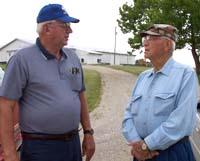Eden Shale Research Farm Part of State's History
Eden Shale Research Farm Part of State's History


Eden Shale farm manager Joe Wyles (left) chats with former farm manager O. D. Hawkins.
Eden Shale Research Farm began in 1953 when some Owen County farmers were talking about needing agricultural research applicable to the area’s unique typography and soil, according to O. D. Hawkins, a spry 91-year-old who helped establish the farm and was its first manager from 1955 to 1978.
Hawkins was chairman of a Farm Bureau committee that helped raise money and scouted county-nominated farms to establish Eden Shale Research Farm. Area farmers and agri-businesses donated the money. Farmers were asked to give one cent for each acre of land owned. Approximately $65,000 was raised. Eventually about five farms became Eden Shale Research Farm, which centers a triangle formed by Lexington, Louisville and Cincinnati.
“When we were scouting farms, a man asked me why we were looking at one that had worn out 25 years ago,” Hawkins said. “The hillsides were covered with bushes and trees – scrubby cedars and briars. We wanted neglected land to prove that farmers could successfully use the research results in their operations.”
When the farm was turned over to the University of Kentucky College of Agriculture in 1955, it was said that “the land was so rundown that a rabbit passing through had to carry his dinner.”
Hawkins said UK College of Agriculture Dean Frank Welch supported the idea for the farm and visited to see how everything was progressing.
The name “Eden Shale” is a combination of the soil type that dominates the Eden Hills region, with Owen County in the center, and shale-type rock common to the region.
“This soil is a heavy, clay-based type that is easily erodible and has very little organic matter or water-holding capacity,” said Kim Strohmeier, Owen County Cooperative Extension agent for agriculture and natural resources. “The close, parallel clay sheets are quite vulnerable to collapsing onto each other, which traps nutrients and makes them unavailable to plants. This creates unique soil management responsibilities for farmers.”
More than 30 surrounding counties have some of the Eden soil series. It is a predominate soil in about 25 counties, according to Joe Wyles, who began working on an agronomy research project at the farm in 1969, and has been manager since 1979.
“This is the only place in the world you will find this type soil,” he said.
“We were talking about this unusual soil one day,” Hawkins added. “Someone said when God created the world He had some things left over and dumped them here.”
Recalling the beginning days of Eden Shale Farm, Hawkins said “People had 150 acres and wanted to make a living on the farm. At one time I was farming 400 head of cattle and 40,000 pounds of tobacco. Now, there are not that many full-time farmers; most have other jobs and use farming to supplement income. This situation continues to make research to help farmers diversify and increase net profits extremely important.”
Using materials from boxes of letters, other papers and early pictures, Hawkins has begun working on a history of Eden Shale Farm for its 50th anniversary next year.
“I have six to eight yellow tablet pages written,” he said.
Sources: O. D. Hawkins 502-484-5531
Kim Strohmeier 502-484-5703
Joe Wyles 502-484-5531